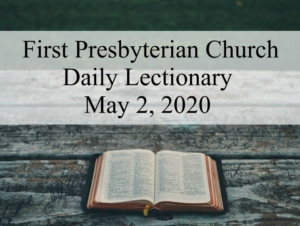
Second Reading Colossians 3:1-17
Gospel Reading Matthew 4:18-25
So if you have been raised with Christ, seek the things that are above, where Christ is, seated at the right hand of God. 2 Set your minds on things that are above, not on things that are on earth, 3 for you have died, and your life is hidden with Christ in God. 4 When Christ who is your life is revealed, then you also will be revealed with him in glory. 5 Put to death, therefore, whatever in you is earthly: fornication, impurity, passion, evil desire, and greed (which is idolatry). 6 On account of these the wrath of God is coming on those who are disobedient. 7 These are the ways you also once followed, when you were living that life. 8 But now you must get rid of all such things – anger, wrath, malice, slander, and abusive language from your mouth. 9 Do not lie to one another, seeing that you have stripped off the old self with its practices 10 and have clothed yourselves with the new self, which is being renewed in knowledge according to the image of its creator. 11 In that renewal there is no longer Greek and Jew, circumcised and uncircumcised, barbarian, Scythian, slave and free; but Christ is all and in all!
12 As God’s chosen ones, holy and beloved, clothe yourselves with compassion, kindness, humility, meekness, and patience. 13 Bear with one another and, if anyone has a complaint against another, forgive each other; just as the Lord has forgiven you, so you also must forgive. 14 Above all, clothe yourselves with love, which binds everything together in perfect harmony. 15 And let the peace of Christ rule in your hearts, to which indeed you were called in the one body. And be thankful. 16 Let the word of Christ dwell in you richly; teach and admonish one another in all wisdom; and with gratitude in your hearts sing psalms, hymns, and spiritual songs to God. 17 And whatever you do, in word or deed, do everything in the name of the Lord Jesus, giving thanks to God the Father through him.
By week six (or is it seven?) in quarantine, it may be difficult to clothe ourselves with compassion, kindness, humility, meekness, and patience. They, like everything else, lie discarded on the floor, ready for the wash. We pick up what’s left over—anger, malice, wrath, slander, or abusive language. We can keep up the good feelings for a while; but, if this goes on for long enough the darker parts of ourselves are bound to come out. When we see comparisons like these, then, lists of vices and virtues, maybe we feel a little bit guilty. Despite some experience with the one, we might be prone to revert to the other. Paul, of course, knows this—because he deals with churches, which display both lists in abundance. The issue isn’t that we only have one list. We all have both. But, by the word of God dwelling in us richly, we receive the wisdom to admonish one another in all wisdom, giving thanks to God in the name of the Lord Jesus. That’s why Paul preferences his list of virtues with the command to forgive one another. The vice list comes first, then the forgiveness, then the virtue. We know all this already—that’s why we end with thankfulness.
Gracious God, we thank you, we praise you, for you have taken the worst that’s in us and redeemed it in your love. Help us to forgive others as we have been forgiven, and to dwell in your word with gratitude and thanksgiving. Amen.
